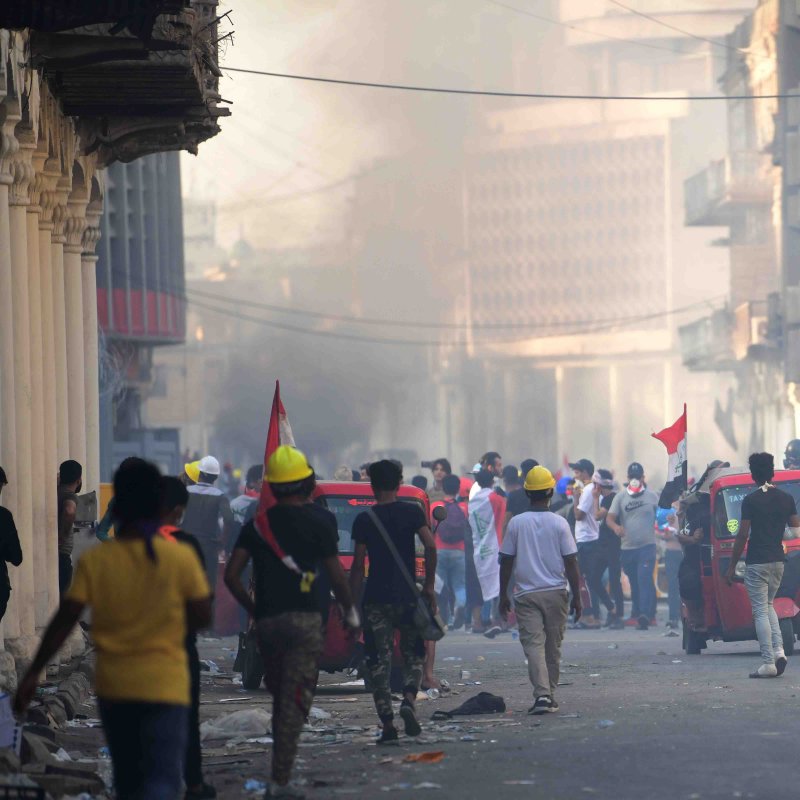Demonstrators take part in an anti-government protest in Baghdad on Thursday. Photo by Murtaja Lateef/EPA-EFE
Nov. 9 (UPI) -- Hundreds of people have died and tens of thousands have been injured in anti-government protests since October throughout Iraq, a human rights organization said Saturday.
In a statement, the Independent High Commission for Human Rights of Iraq said at
least 301 have died and nearly 15,000 injured from the use of force against demonstrators and killings by armed elements.
The United Nations Human Rights Office of the High Commissioner said Friday it was "gravely concerned" about a reported 269 deaths and 8,000 injuries, including members of the Iraqi security forces, between Oct. 1 and Thursday.
"The exact casualty figures may be much higher," the U.N. office said. "The majority of the casualties have resulted from the use of live ammunition by security forces and armed elements, described by many as private militia groups, as well as the unnecessary, disproportionate or improper use of less-lethal weapons such as tear gas."
On Friday, two people who were killed in the southern city of Basra during violent protests. Demonstrations have occurred in Baghdad, Dhi Qar and Karbala.
The IHCHR in a statement Thursday said it "calls on all parties to end bloodshed and maintain peaceful demonstrations."
"As the IHCHR asserts the constitutional guarantees of freedom of opinion expression, demonstration and peaceful assembly as well as the need to unify legitimate demands to protect and promote human rights in Iraq."
Human Rights Watch said cartridges were being fired directly at protesters in Baghdad.
CNN reported the protests are believed to be the biggest since the fall of former Iraqi President Saddam Hussein in 2003. Demonstrators want early elections because of corruption, unemployment and inadequate basic services.
On Oct. 31, Iraqi Prime Minister Adil Abdul Mahdi agreed to resign on the condition that a successor is agreed to replace him, President Barham Salih said in televised speech to the nation.
In an effort to quell the situation, officials have used lethal force, imposed curfews and blacked out the Internet.
Demonstrators have disputed the government's assertion that personnel only shoot when attacked.
"We urge the Iraqi government to ensure it complies with its obligation to protect the exercise of the right to peaceful assembly," the U.N. agency said. "This means taking preventive steps to protect demonstrators from armed elements, as well as issuing clear instructions to security forces to abide by international norms and standards on the use of force, including for example, an explicit prohibition on the shooting of tear gas canisters directly at demonstrators."
The U.N. office said it is "alarmed by reports of the abduction, by unknown perpetrators, of protesters or volunteers providing assistance in the demonstrations. These allegations should be promptly investigated, the whereabouts of those missing clarified and those responsible held to account."
The High Judicial Council in Iraq has declared the Federal Anti-Terrorism Law would be applicable against those resorting to violence, sabotaging public property and using firearms against security forces. These are acts of terrorism that may be punishable by death.
The U.N. office said it was "disturbed" by the council's statement.
"We call on the authorities to take firm steps towards a meaningful dialogue in Iraq, to take stock of the many grievances and work with a broad range of actors towards a sustainable resolution to the many challenges Iraq faces," the U.N. agency said. "We stand ready to assist."















